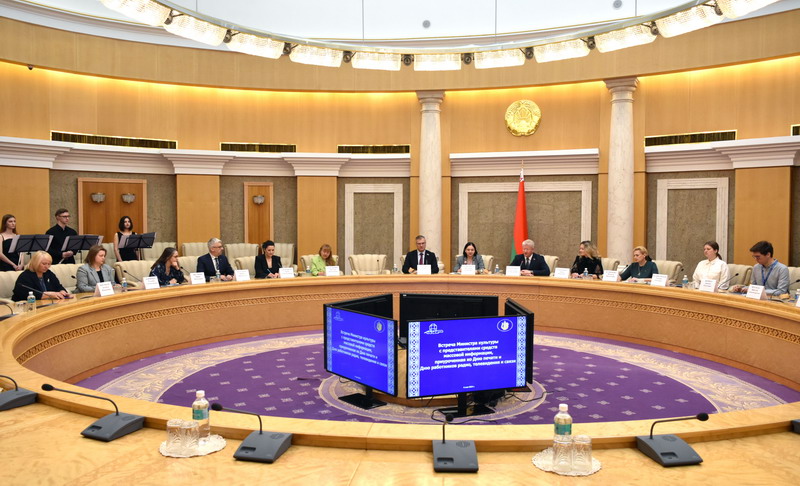A thematic book exhibition "Oceans of the planet Earth: development, research, preservation” timed to the World Oceans Day runs in the Documents of international organizations reading room (207g) from 7 June to 31 July.
This Day was proclaimed by the UN General Assembly on 5 December, 2008 (resolution 63/111) and has been observed annually on 8 June since 2009.
Oceans cover three-quarters of our planet’s surface and contain 97 percent of Earth’s water resources. Their temperature, chemical processes, currents and life determine the effect of global systems that make Earth suitable for human existence. Rain and drinking water, weather, climate, coastlines, much of our food, and even oxygen in the air we breathe, all is ultimately provided and regulated by the world’s oceans. The ocean has untold wealth and opportunities. Its resources are the key to life and further development of human civilization. The security, health and productivity of the world’s oceans are an integral component of human well-being, economic security and sustainable development of society.
The oceans are huge, but their ability to withstand damage caused by human activities is not unlimited. The diversity of species found in the oceans is threatened. The negative effects of human activity – the overexploitation of living marine resources, pollution of the oceans with dangerous substances and wastes of industries, climate change and ocean acidification are a serious threat to the marine environment.
To take full advantage of the benefits conferred by the oceans, humanity has to protect the marine environment and carefully manage its resources. Saving the oceans and doing everything for their environmental well-being is one of the most important problems of modern society.
The United Nations Environment Programme and the International Maritime Organization (IMO) are engaged in the protection of the marine environment. The latter is the United Nations specialized agency responsible for taking measures to prevent marine pollution from ships and enhance the safety of international shipping. This organization has developed more than 40 conventions and agreements on the protection of the marine environment, including the United Nations Convention on the Law of the Sea http://www.un.org/russian/documen/convents/lawsea.html 1982, which is called the "constitution of the oceans".
The oceans are an important subject of research. A more complete knowledge of the processes occurring in the oceans will allow predicting tsunami, hurricanes and droughts, making the world less dependent on the elements. Penetrating deeper into the mysteries of the oceans, scientists continue to discover new forms of marine flora and fauna. Vast expanses of the deep sea keep a lot of secrets, and still the ocean is one of the most enigmatic and poorly known objects in the world.
Publications on display are about resources and processes of the oceans, introducing the reader to the international system of measures and regulations aimed at ensuring the safety of maritime navigation and the protection of the marine environment.
The exposition includes about 60 documents: books, brochures, periodicals and mimeographed materials. Most of the exhibition are documents of international organizations in Russian, English and French.
The exhibition consists of the following thematic sections:
- The oceans: history, geography, nature.
- Ocean resources and their development. World Ocean Studies. Oceanology.
- The Law of the Sea. Ensuring the safety of maritime navigation. IMO activities.
- Pollution and conservation of the oceans.
- International cooperation on joint use of the seas and oceans.
The exhibition is designed for specialists in the Law of the Sea, ecologists, seamen, biologists, oceanographers, as well as a wide range of readers interested in the research of sea depths and the problems of the oceans and seas.
Useful links
- Division for Ocean Affairs and the Law of the Sea
- The International Seabed Authority
- the International Maritime Organization (IMO)
- International Tribunal for the Law of the Sea
- The United Nations Environment Programme (UNEP)
- The World Oceans Network
- UNESCO page “The World Oceans’ Day”
- UN and the Law of the Sea
- UNESCO Intergovernmental Oceanographic Commission
- IMO’s contribution to sustainable development of the marine industry
- Protection of the oceans, all kinds of seas, including enclosed and semi-enclosed seas, and coastal areas and the protection, rational use and development of their living resources (chapter 17 of the Agenda XXI Century)
- The World Oceans’ Day (8 June)
- The World Water Day (22 March)
- The international decade “Water for Life” (2005–2015)
Contact: (+375 17) 293 27 34.
 |
 |
 |
 |
 |
 |
 |










